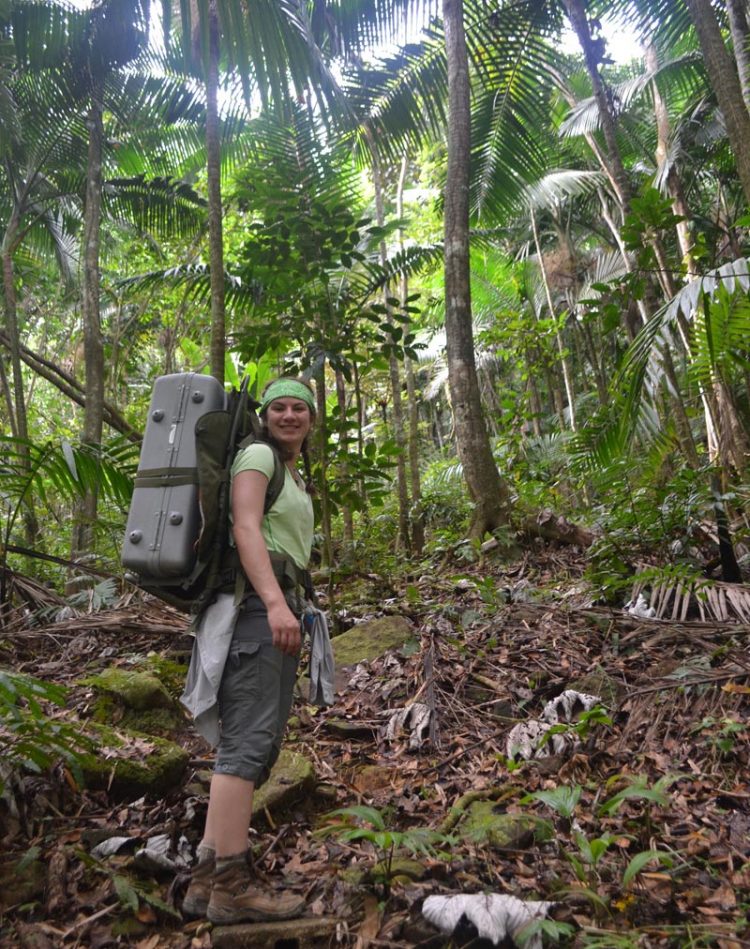How Will Climate Change Impact Tropical Rainforests?

Michigan Technological University Michigan Tech graduate student Alida Mau in Puerto Rico's El Yunque National Forest
Michigan Technological University researchers are joining US Forest Service and US Geological Survey scientists in the only tropical rainforest in the United States, to get a handle on the impact that climate change—particularly warming—is likely to have on the tropical forests of the world.
The Tropical Response to Altered Climate Experiment (TRACE) research project is supported by the U.S. Forest Service with an additional three-year, $960,000 grant from the US Department of Energy.
Molly Cavaleri—a tree physiologist who studies how ecosystems are responding to climate change at Michigan Tech’s School of Forest Resources and Environmental Science—is thrilled to be heading the study in the El Yunque National Forest in Puerto Rico.
“This is the first field experiment of its kind ever done in a tropical forest,” she says. “We will be manipulating the environment, warming the leaves and branches of the canopy as well as the smaller plants on the forest floor, not just observing.”
Forests of all kinds help control greenhouse gases, particularly carbon dioxide, in the atmosphere because trees take in and store more CO2 than they put out. But unlike forests in temperate climates, where temperatures vary widely from season to season and trees have adapted to those changes, tropical forests grow in consistently warm climates, and no one knows how or even if they can acclimate if those climates get hotter.
And they are getting hotter and will continue to do so, climate experts say. “Within 20 years, the new minimum temperatures in the tropics will be hotter than the current maximums,” says Cavaleri.
The Michigan Tech researcher and two other research ecologists are leading the study: Tana Wood, from the Puerto Rico Conservation Foundation and adjunct scientist with the U.S. Forest Service International Institute of Tropical Forestry, and Sasha Reed with the U.S. Geological Survey. Eoin Brodie from the Lawrence Berkeley National Laboratory will join them as a collaborator.
“It’s unusual for three early-career women to be spearheading a project of this size and significance,” Cavaleri noted.
Michigan Tech graduate student Alida Mau is already in Puerto Rico, taking measurements in the forest. Cavaleri and her colleagues will be heating the soil and small trees on the forest floor with infrared lamps and running warming cables under the leaves of the canopy of full-grown trees, then collecting data about the responses of leaves, roots, and soil.
“We want to know how sensitive tropical forests are to warming, what physiological changes it will cause, particularly how it affects the trees’ ability to store CO2,” Cavaleri said. “If we tip them over a threshold where it’s too warm, they may not be able to take up as much CO2. They may even start giving off more CO2, which could lead to more warming.”
Once they have warmed the trees and measured the changes, Cavaleri, Reed and Wood plan to use the data to help develop better predictive models of the effects of climate change on tropical forests, an effort funded by the USGS Powell Center. “The data will help us understand what is happening globally and what is likely to happen in the future, Cavaleri explained.
She also added, “We don’t know what we are going to find, so we are not advocating any particular policy.”
Cavaleri said working in Puerto Rico is a pleasure, much easier than conducting research in other tropical locales. “There is electricity, no problem with permits, a Forest Service research station with dormitories,” she said. “There aren’t even any venomous snakes.”
Michigan Technological University (www.mtu.edu) is a leading public research university developing new technologies and preparing students to create the future for a prosperous and sustainable world. Michigan Tech offers more than 130 undergraduate and graduate degree programs in engineering; forest resources; computing; technology; business; economics; natural, physical and environmental sciences; arts; humanities; and social sciences.
Media Contact
More Information:
http://www.mtu.eduAll latest news from the category: Ecology, The Environment and Conservation
This complex theme deals primarily with interactions between organisms and the environmental factors that impact them, but to a greater extent between individual inanimate environmental factors.
innovations-report offers informative reports and articles on topics such as climate protection, landscape conservation, ecological systems, wildlife and nature parks and ecosystem efficiency and balance.
Newest articles

Long-sought structure of powerful anticancer natural product
…solved by integrated approach. A collaborative effort by the research groups of Professor Haruhiko Fuwa from Chuo University and Professor Masashi Tsuda from Kochi University has culminated in the structure…

Making a difference: Efficient water harvesting from air possible
Copolymer solution uses water-loving differential to induce desorption at lower temperatures. Harvesting water from the air and decreasing humidity are crucial to realizing a more comfortable life for humanity. Water-adsorption…

In major materials breakthrough
UVA team solves a nearly 200-year-old challenge in polymers. UVA researchers defy materials science rules with molecules that release stored length to decouple stiffness and stretchability. Researchers at the University…



